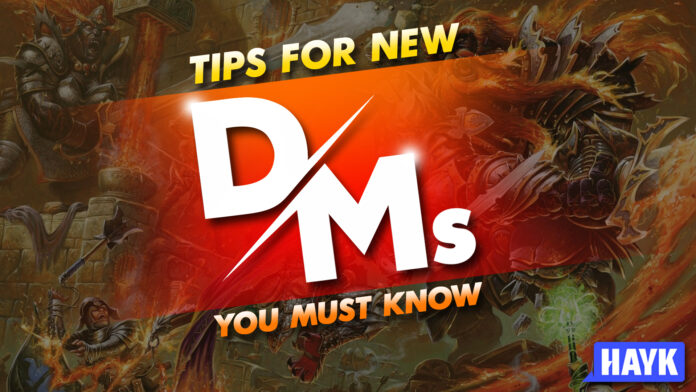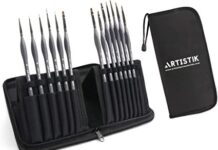
So, are you looking to view some new and helpful Dungeon Master (DM) tips before you finally sit behind the DM screen for the first time?
We can’t lie to you, it can be scary, especially if you’ve never done it before. ‘Will they laugh at me when I do character voices? What if I forget certain rules of the game?’ Well, relax! Yes, being the DM comes with a lot of responsibility, but the experience you get from it is incredibly fun and rewarding as you craft the world in which other players set out to adventure.
Contents of this Page
Now, in case you don’t know, a Dungeon Master (DM) is the referee in a Dungeons & Dragons game session, where the other players create their own characters which they use to interact with the imaginary world that’s depicted in the game. The DM plays a crucial role that even goes beyond the other players in the game.
In fact, he or she is technically the one who runs and helps direct the game session, where he/she acts as a moderator, story designer, and narrator. As the players –through the actions of their characters – interact with each other in the imaginary world, the DM is the one who describes each scene, directs the action, and might also play the roles of villains or monsters that the characters encounter on every adventure.
Remember, as the DM, you are not competing against the other players, but you are simply setting up exciting, interesting, and challenging situations, where you will apply game rules and then allow events to play out.
This is why we started by saying that playing the DM role can be free but scary. But we also said that it can be a lot of fun and free as well once you get the hang of it. Having said that, here are a few tips to help you run a game that your group will never forget.
Tips for New Dungeon Masters for A Successful Session
Keep it fun
For starters, keep in mind that Dungeons & Dragons is a game, session and so, the main goal for everyone participating is to have fun. And as we mentioned earlier, the role of the DM is to describe the imaginary world and to set the stage for everyone to have fun. Remember, at the end of the day, if everyone was laughing, cheering, and engaging, just know that you’ve succeeded.
Fun is the most crucial aspect in any Dungeons & Dragons game session, closely followed by the story and the rules. So, for the several hours that you will be playing this game, you should make it count by ensuring that everyone is having a good time, including yourself. Basically, always remind yourself that this is collaborative storytelling, and never ever fall into the “DM vs players” mentality as it will ruin the fun.
Also, give yourself room for flexibility and take it easy. And something else, if there is any flexibility regarding the rules, it should always be in favor of the players, as it not only keeps them excited, but also keeps the story moving forward, making the game even more fun.
So, the rule of the thumb here is, don’t overwhelm yourself! For you to perfect being a dungeon master, it will take time and lots of practice. With time, you will improve. Focus on having memories, for example, like creating fun memories with your group?
Set clear goals and rules for the campaign
Before you start, you need to set expectations for the type of campaign you like to run. You don’t want to start rolling without determining what you want to achieve. You can choose a horror campaign if it’s the Halloween season, for instance, or a trip to the desert for treasure hunting, or anything else – it is better than nothing, you know.
Having expectations not only helps in getting the players excited, but it also gives them ideas on what characters each one is to make.
To help you understand, imagine this example, a player has already made a character, and has an amazing backstory, and is actually super excited about the game session, only for him/her to find out that the setting was completely different from what he/she had in mind, and that it’s completely incompatible with their character.
What do you think such a player will feel? This is exactly what could happen if you don’t communicate the expectations of the campaign before the game session starts.
If the expectation is an adventure trip to go treasure hunting through a desert, the players need to know this so that they can make characters that are compatible, and also come up with desert backstories. It also gives the players ideas on the type of enemies they are likely to encounter in the adventure.
Do your homework well
Remember what we said at the beginning of this article, about a DM having some extra responsibilities? Well, that’s very true, and for that reason, you ought to do some homework.
For instance, you need to familiarize yourself with the rules of the game session, and also take a few notes on crucial mechanics that would really help in moving the game along. And if it’s a module you will be running, you absolutely need to read ahead. You would like to at least be able to have an idea of where the players will be going, and most importantly, what to expect. Otherwise, the experience might be not so fun for you.
Consider modules and clichés
When you take on the mantle of the DM, it doesn’t mean that you have to reinvent everything. As a matter of fact, the thought of having to come up with an original story is one of the things that freaks so many new DMs out.
In a game session of Dungeons & Dragons, clichés are your friend! Especially if you are learning to be a new DM, the familiarity will be very helpful. You just need to keep it simple and concentrate on creating an enjoyable game.
Moreover, the modules released for the D&D 5th edition are fantastic, as they enable you to learn the game’s mechanics plus other finer elements that allow you to design dungeons and crafting stories. DmsGuild is a good way to check out if you’re interested to see more modules.
Let the player characters be, don’t control them
No matter how tempting it may be, railroading is lame, and you should never attempt it. One of the aspects that makes D&D so fun to play is the ability of the players to make their own choices in a reactive fantasy world.
When you tell the players what to do, or what emotions to portray, you are basically robbing them of the experience of playing their characters – or you can also say that you are robbing them of fun.
Consider encouraging the players to add flavor to their characters as a great way for them to “buy-in” to the world you are creating. Generally, give them a chance to add some cinematic flair to their characters. Remember, as DM, your main role is to facilitate the play.
Take organized notes
As the Dungeon Master, there will be too much information coming your way, and so, you may like to take down some notes as the game progresses to help you remember. Consequently, you also need a note-taking system that would work for you. Having said that, here are the best note-taking strategies that you could choose from;
- The Classic Notebook – this is a system that has been tried before and we can tell you that it works. See, you will simply be taking notes in a binder or a notebook. It is one of the most attractive option, whereby you will be able to separate information into sections, enabling you to refer back to them easily
- Sticky notes galore – there are dungeon masters who prefer to write down brief and important notes on a sticky note where they then stick them to their DM screens. For us, this method is more fun and creative and it’s also an advice we personally recommend. The problem is though, if you stick too many notes on the screen, your screen might become engulfed in sticky notes. So, you ought to be creative and find other places to stick those notes.
- Take it all digital – you can also choose to take the notes technologically through certain programs on your phone, tablet, or laptop, thereby keeping your space tidy and uncluttered.
Talk to the players before the game
Communication is key in everything, and when it comes to a game of Dungeons & Dragons, it is certainly needed for a good game.
As a new DM, you need to take some time and talk to the players about the game, where you try to read the mood and learn about everyone’s goals and expectations. Talk to each player and ask them what they are hoping to get out of the D&D experience.
Also, try to find out whether they are more combat-oriented or are more focused on role-playing. This way, you will be able to come up with ways on how to cater for the campaign as well as the overall D&D experience to your players. Also, everyone will be able to enjoy the experience greatly, as you will giving them exactly what they like.
Be descriptive
What D&D players don’t like to hear when they play a game session is a bland or boring description of everything. See, the manner in which a DM describes a new character or an imaginary location can tell a lot about the atmosphere, whereby, a new location can come across as lively, mysterious, dreary, or unsettling, based on the description alone.
So, you must be able to choose your words very carefully in your descriptions. For instance, in horror-themed campaigns, creating the right atmosphere is key to inducing fear among the characters, which is exactly what you like in such a campaign.
And when we talk of being descriptive, remember not to overdo it, as describing a character or a location in too much detail can bore the players, and that would mean game session over.
Prepare to improvise
Another tip is, don’t over plan your campaign or hope that it will go one certain way. You got to be ready to improvise during the game. The ability to improvise during the game session is the most useful skill any Dungeon Master can cultivate, and that’s based on the experiences of thousands of DMs.
To start with, just curate and print out random names that you can quickly refer to just in case the characters meet non-player characters (NPCs) you weren’t expecting. Also, rather than creating plots and stories, you can choose to set up situations and allow the characters to navigate the situation.
You know, maybe try playing monsters, NPCs, and villains, and have the players react as they would be based on the character’s actions.
So, what do you need for the game?
The D&D game session does have a few requirements. Other than players, a dungeon master, and an adventure – which are obvious – the following items will also be needed to play the game:
- The game itself – Dungeons & Dragons is a unique roleplaying game that’s presented in 3 core books – the Dungeon Master’s Guide, the Player’s Handbook, and Monster Manual. And to those new to the hobby, they can get the basic game that generally comes in a box.
- Dice – there is a unique collection of dice used in the game session, where each dice has a different number of sizes. The dice are a crucial part of the game, as they bring a random element into the game, which makes it interesting. In fact, the dice turns D&D into a game, rather than an improvisational activity, that it could turn to otherwise.
- Character sheets – every player in a Dungeons & Dragons game needs a character sheet that details their role individually. Getting these character sheets is pretty easy, as you can just photocopy them out of the Player’s Handbook or you can even purchase them in a pack. When filling them, the players are required to use pencils since the game stats changes as the character progresses, which means that you might want to delete some stats or add some.
- DM screen – as a Dungeon Master, of course, you need a DM screen, which not only provides tables and charts that you will need in the game session, but also helps in hiding your notes, maps, and other accoutrements from other players. You don’t want anyone peeking at what you have in store for them.
- Miniatures plus a battle grid – a DM guide comes with a battle grid, which is a play surface where your miniatures represent tactical situations. But this is not the only play surface, there are others available in your nearest game shop. Moreover, D&D miniatures booster packs contain a number of hero figures and cool monsters that you can use to represent various characters when in tactical situations. Even though miniatures and a battle grid aren’t that necessary in a D&D game, their presence facilitates speeding up of the play as well as helping players to visualize the kind of situations they put their characters in.
- Pencils and papers – of course, you will need to keep some notes, and a pencil and a piece of paper will help you do just that. You will also like to track the progress, write down any treasure you find, and any other crucial information about the game. Remember we also said that there are other ways you can use to do this – you just need to choose the method that works for you.
What makes a great DM for D&D games?
Having enough time to plan – to be a great DM, you need to have or set aside, enough time not only for the actual game sessions, but also to prepare adequately for it before playtime. This is especially true when you are creating your own adventure. But also if you are using an already-created adventure, you will need time to read it and understand it to facilitate smooth gameplay. If you don’t have enough time as a new DM, you might have a very hard time, unless, of course, you are insanely good at improvisation!
You must be willing to listen to the players – in as much as you are the one guiding the game, it is also important that you listen to the players if you want the game to progress smoothly. Remember, the primary goal of the game is to have fun, so if you don’t like to listen to the players, then, of course, they won’t be having any fun.
Knowing when to ignore the rules – to be a good DM, you need to know when to adjust the rules in favor of fun. Let’s say that there is a player who is super excited about doing something cool, but the rules don’t allow it, as a good DM, you need to consider bending the rules a bit to allow it to happen, for the good of the game. You are the one who calls the shots in the game, and so, you should know when is right to bend the rules and when not to.
The ability to know when to fudge dice rolls – with the DM screen at play, the players don’t get to see the dice rolls, which means that you can fudge them if you are looking to make things interesting. For instance, if the designed encounter seems super easy for the players, you can fudge the rolls to favor the enemies, and if the players are struggling, fudge the rolls in their favor. Two things you need to keep in mind though; one, don’t overdo it; and two, never tell the players that you are doing it – keep it to yourself.
Types of DnD Players
Now you’re equipped with the essential tips to become a worthy Dungeon Master, it’s also nice to know the different types of DnD Players.
Going above and beyond as a Dungeon Master
As a new DM, there are instances where you would want to enhance your sessions and the overall game experience. So, here are some ideas on how to do it:
Voices – when you incorporate different voices for your NPCs, you enable them to stand out and also allows the players to know each NPC well, and really immerse themselves in the imaginary world you created. Your players are can also use voices for their characters if they want, which makes the game even more interesting.
Music – another inexpensive way of enhancing your sessions is by setting the scene with music. Whether it is a custom-made campaign or a pre-made one, there is always music that you can use to accompany any scenario encountered by your players ranging from a battle to exploring a forest or sitting in a tavern.
Music also comes in handy during storytelling, whereby, for instance, instead of telling the players that they enter a bustling tavern with playing music, you will just need to play the background music and that would tell them what they need to know.
Miniatures – there are instances where the players might require a visual representation of character movement, particularly during battle, and miniatures would certainly help you with this. If you are looking to keep track of the distance in terms of relationships among the characters or between the characters and the enemies, these visual markers will in fact prove very useful.
They can also be very helpful when exploring a cave or a dungeon crawl when you want to keep track of everyone’s position, just in case a creature sneaks up from behind. Just pure fun, folks!
Final thought
As you can see, a Dungeon Master plays a very crucial role in a Dungeons & Dragons game. He/she not only controls the pace of the story, but also referees all the actions as it unfolds. What’s more, the DM is the one who creates the imaginary world within which all the players immerse themselves,word and also enforces the rules in the game.
So, as a new DM, yes, this role might be intimidating, but the truth is, once you get the hang of it, it will be the most fun you will have ever had. Following the tips above, will set you up for success in the long run.





